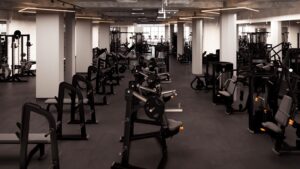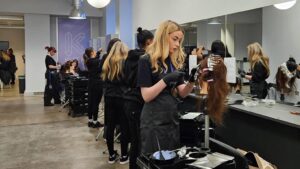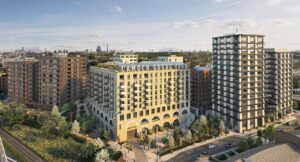
The Basement Gym + Studio opens in Camden Town
Camdenist readers get 50% off their first month’s membership, too

Like food, stories are best shared. In Syria, Hakawati (storytelling), is an ancient art form that travels across much of the Arabic world. Verbal catharsis or energised resistance, these tales can both soothe and mobilise, acting as food for the soul.
Award-winning journalist and social entrepreneur, Sulaiman Othman, has long been fascinated with storytelling as a protective, restorative act. His art project Hikayetna, ‘our story’ in Arabic, provides a home for displaced stories. Sulaiman moved to the UK around 13 years ago to pursue his dream of doing a MA in media and journalism and to work at the BBC.
We’re talking over lunch at Imad’s Syrian Kitchen, a light and bustling joint in Kingly Court, just off Carnaby Street. The table is decorated with garlic and sumac pitta, pillowy and fragrant. Smoky baba ghanoj, studded with pomegranate seeds, joins a crimson muhammara. Sulaiman is drinking a Beirut beer and I’ve just been handed an Aleppo Spritz. A setting sun in liquid form, it’s distinctly apricotty and makes my tongue tingle.
“Kurdish people are a minority in every place. Our culture is not represented, it’s been stolen and destroyed”, Sulaiman explains. “Our story is not written. It has survived through oral tradition.” The existence of Kurdish people has long been linguistically denied. In Turkey, the term ‘mountain Turk’ replaces ‘Kurd’. And ‘Kurd’ was redefined as the sound of footsteps in snow, a dissolution of humanity into something untraceable and melting.
“I want to preserve our culture. I’m trying to build a museum of sorts out of people’s experiences, pictures, memories, and to find common ground.” Hikayetna seeks to reveal our shared humanity, to rewrite the more hostile narratives sometimes plucked out of the human urge to survive. “My question for myself when I was a journalist at the BBC was how can I show the human side of this?” He tells me that in his culture, personal stories are often hidden, clutched privately to one’s chest.

Imad Alarnab, the chef behind the beckoning spread in front of us, knows just how much food, like storytelling, can bring people together. Imad ran three restaurants and several juice bars and cafes in Damascus before they were destroyed in the war. Cooking punctuated his journey to London. “When I was a refugee in Calais, cooking for my fellow refugees helped me survive. It gave me a sense of purpose. It saved me when I was at my lowest. We can reach people through food.” Sometimes he would cook for up to 400 people at a time before going to sleep on the steps of a church.
He describes the most memorable meal he’s ever eaten, prepared by an elderly farmer in Syria. “She invited my daughter and I to enjoy strawberries and cherries from her garden. We ended up staying for dinner and she served us food that she’d grown herself. I still remember the tomatoes, the freshest I’ve ever tasted. She had baked this incredible bread that morning too. It was very simple: bread, peppers, tomatoes, onions, but the ingredients were exceptional and her invitation generous. She didn’t have much yet she treated us like family.”
Seeking to recreate that atmosphere, Imad invites us to join him around his new table, “I want customers to taste an authentic and generous meal, to feel as if they are in my home, visiting a family member.” As we sit in the chalky calm of the restaurant, wooden beams overhead, a light dusting of summer rain scenting the space through half-open windows, it’s hard not to feel at home. Lunch at Imad’s Syrian Kitchen is warm and inviting.

Gathering to eat is a big part of life in Syria. Sulaiman describes sharing a house with his uncles, cousins and grandparents growing up. “We loved it. It was a simple life. Some families would meet for every meal.” Does he miss Syria? “How it was even five years ago, yes. Now? It’s not the same. If I go back, I feel like a stranger. The war destroyed humanity there. There’s nothing left. Everyone’s leaving, including my little nephew. There’s the war, then Covid and then drought. There’s no plan, no peace agreement. My parents and sister are still there.”
Sulaiman’s mum used to sing stories to him as a child. “Traditional Kurdish songs. Very moving about conflict, about the war, about people that you love.” Recently, his aunt sent him a recording of his mum singing, and one of his nieces. “It was lovely, moving. We have particular songs for different occasions. They want me to get married so they can sing!”
We’re interrupted by the arrival of fattoush, vegetable Hindi and jaj barghol, grilled chicken thigh with bulgur wheat and mixed spices. The fattoush is light with thin ribbons of crispy flatbread that crunch with the baby gem lettuce and cucumber. It’s tasty, though Sulaiman says it’s not how he remembers it. “Usually, the bread is thicker and there aren’t normally olives in it.” He’s a big fan of the baba ghanoj though and the chicken, charred on the grill and tender, gets his approval too. The vegetable Hindi is warming with its delicately spiced tomato sauce.
I’m bringing another spoonful up to my mouth when Sulaiman begins to express his disbelief at the clutch shakshuka has on the UK. Typically the fare of students or soldiers, he was shocked to discover that people pay up to £15 for it at brunch. “Three years ago, my friend said we had to go to this restaurant in Hampstead. We went and they ordered shakshuka!” I ask him if he likes British food. “I’ve had fish and chips before.” I can feel the restraint behind his neutrality. “Did you like it?” I persevere. He pauses, “not too much.”
I seek redemption and order the Syrian ice cream. Tasting subtly of pistachio, and intriguingly chewy, the ice cream comes jeweled with pistachio garnets and softened by wisps of pashmak (Syrian candy floss). It looks like the sort of concoction a child, one who is regularly told they have an old soul, would dream up.

Collecting stories as they emerge is gruelling work. Sulaiman was a translator and transcriber on the 2016 documentary Exodus, a heart-breaking depiction of the refugee crisis, and on a documentary for ITV news about some children who lost their parents in the winter, buried under snow. “I had to listen to all these stories. I’d wake up in the morning and translate the details, still crying from the day before.” Now he wants to provide more light, and celebrate the joy, culture, heritage and art, that humanity often left scattered amongst the dust. “We don’t leave enough room for the positive stories. It’s a weight in my body. I’ve already seen too much.”
He describes how right-wing media has had an impact on people’s receptiveness. “It’s great to open a border, to welcome people, but it’s most important to open your heart.” Once you arrive here, any relief you might feel is soon drowned by a pool of paperwork and confusion. According to the charity Refugee Action, people seeking asylum are not allowed to claim benefits or work in the UK. They can apply to receive asylum support, around £5.66 per day. When someone is granted refugee status, they have 28 days to find housing and apply for mainstream benefits before they are evicted from asylum accommodation.
Does anything make Sulaiman feel more hopeful? “That’s a good question. I don’t have the answer. I used to, but now I don’t know. I guess I trust people. That might be my issue!” For Imad, food can be soothing. “Hummus brings me comfort. I follow a Syrian recipe called Musabaha. It’s served warm with tahini on the side. Traditionally, we used to have it every Friday after the prayer gathering.”
Not only have Sulaiman and Imad managed to create homes for themselves against a backdrop of destruction, but they also welcome people to share from their plates and their pages. Food and stories are the mycelium underpinning our humanity. The darkest times truly illuminate just how much we need them, and each other. The generosity of people who are simply asking to live, and who face ridicule for the survival instinct we all share, is remarkable. The food they bring to the table is decidedly tastier than fish and chips, too.

Visit hikayetna.com to find out more about Sulaiman’s work including events and workshops.
@imadssyriankitchen @sulaimanos1
If you enjoyed this article, read more every week at Camdenist.com and our next 32-page print magazine, coming very soon.

Camdenist readers get 50% off their first month’s membership, too

A brand new hairdressing and barbering academy has landed in Camden Town and is now seeking style-conscious models and enthusiastic trainees

We speak to founder, Sol, about bringing the studio to Kentish Town

Explore the neighbourhood’s brand new neighbourhood